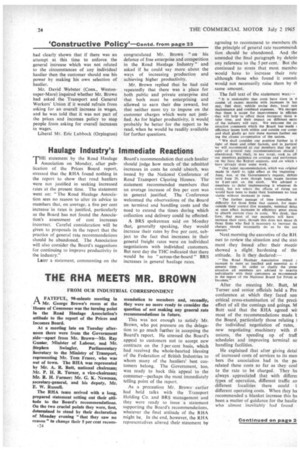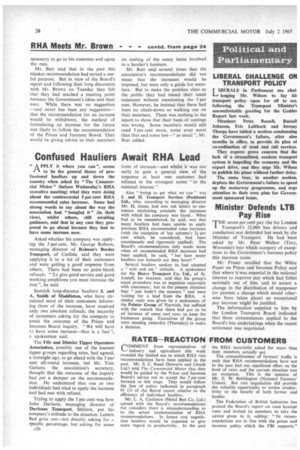THE RHA MEETS MR. BROWN
Page 26

Page 28

If you've noticed an error in this article please click here to report it so we can fix it.
FROM OUR INDUSTRIAL CORRESPONDENT
AFATEFUL, 90-minute meeting in Mr, George Brown's room at the 'House of Commons was the turning point In the Road Haulage Association's attitude to the report of the Prices and Incomes Board.
At a meeting late on Tuesday afternoon there were from the Government side—apart from Mr. Brown—Mr. Ray Gunter, Minister of Labour, and Mr.
Stephen Swingler, Parliamentary Secretary to the Ministry of Transport, representing Mr. Tom Fraser, who was out of town. The RHA was represented by Mr. A. R. Butt, national chairman; Mr. P. H. R. Turner, a vice-chairman; Mr. R. H. Fanner; Mr. G. K. Newman, secretary-general, and his deputy, Mr. E. W. Russell.
The RHA team arrived with a long, prepared statement setting out their attitude to the Board's recommendations. On the two crucial points they were, first, determined to stand by their declaration of Monday evening "that they saw no reason" to change their 5 per cent recom , 24 mendadon to members and, secondly, they were no more ready to consider the question of not making any general rate recommendations in future.
This was not enough to satisfy Mr. Brown, who put pressure on the delegation to go much further in accepting the Board's report. He stressed the Board's appeal to customers not to accept new contracts on the 5 per cent basis, which had received the whole-hearted blessing of the Federation of British Industries to whom many of the hauliers' best customers belong. The Government, too, was ready to back this appeal to the consumer—perhaps the most immediately telling point of the report.
As a precaution Mr. Brown earlier had held talks with the Transport Holding Co. and BRS management and they were ready to issue a statement supporting the Board's recommendations, whatever the final attitude of the RBA might be. In the end, however, the RHA representatives altered their statement by agreeing to recommend to members th: the principle of general rate recommend; tion should be abandoned. And the amended the final paragraph by deletin any reference to the 5 per cent. But the Continued to stress that most membe, would have to increase their rate although those who found it essenti: would not necessarily raise them by tt same amount.
The full text of the statement was:-" It is undeniable that costs have risen in il course of recent months with increases . in bas Pay, fuel duty, vehicle excise duty, local rate maintenance and overhead expenses. We recogni that there is scope for improvement in efficieo that will help -to offset these increases; these w take time, and their impact on different seats of the industry will vary. We welcome the co structive comments which the Board has made efficiency Issues both within and outside our contrt and shall gladly go into these matters further see ing the closest co-operation of the unions.
" We shall consider our position further in light of these and other factors, and in particul we will recommend to our members that the on aisle of general rate recommendations should I abandoned. We shall, in any event. seek to off our members guidance on costings and performan on the lines the Report suggests, and on which v have already done some work.
" Our latest recommendation, which was original made in April to take effect at the beginning June. was, at the Government's request, deferr. until June 29, even though basic wages increas.
by 6 Per cent on the ninth. We advised o members to defer implementing it wherever th could, but not where the effects of rising cos would have been to make their businesses no long viable without increases in rates.
" The further passage of time intensifies tt difficulty for those firms that cannot, for tease outside their control (for example, terminal dela) at once effect increases in efficiency great enow to absorb current rises in costs. We think, thee fore, that most of our members will have increase their rates. though this does not mean lb those firms who find it necessary to increase the charges should necessarily do so by the sac amount."
Next morning the executive of the RI-I. met to review the situation and the stab ment they issued after their meetir showed a slight, hardening of the attitude. In it they declared:—
" The Road Haulage Association regard increase in rates as justified and essential at tl present time. In order to clarify the prese situation all members are advised to negotia individually with their customers as recommend. in the report of the National Board for Prices at Incomes."
After the meeting Mr. Butt, M Turner and senior officials held a Pre conference at which they faced son critical cross-examination of the preci: effect of all the comings and goings. M Butt said that the RHA agreed wit most of the recommendations made the Board, particularly those relating the individual negotiation of rates, new negotiating machinery with ti unions, ' the speeding up of traff schedules and improving terminal at handling facilities.
He explained that after giving detai of increased costs of services to its men hers the association had in the pa related these costs so far as they coul to the rate to be charged. They ha always appreciated that with differet types of operation, different traffic an different localities there could t different operating costs. When they ha recommended a blanket increase this ha been a matter of guidance for the haulie who almost inevitably had found
necessary to go to his customer and agree the rate.
Mr. Butt said that in the past this blanket recommendation had served a useful purpose. But in view of the Board's report and following their long discussion with Mr. Brown on Tuesday they felt that they had reached a meeting point between the Government's ideas and their own. While there was no suggestion —and never has been any suggestion— that the recommendation for an increase would be withdrawn, the method of formulating an increase for the future was likely to follow the recommendation of the Prices and Incomes Board. They would be giving advice to their members on costing of the many items involved in a haulier's business.
Mr. Butt said several times that the association's recommendations did not mean that the increases would be imposed, but were only a guide for members. But to make the position clear to the public they had issued their latest statement without mentioning the 5 per cent. However, he insisted that there had been no climb-down or walking out on their members. There was nothing in the report to show that their basis of costings was wrong. Some members would still need 5 per cent more, some even more than that and some less—" as usual ", Mr. Butt added.
























































































































